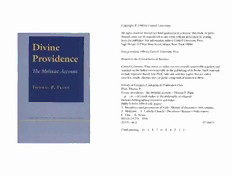Download Divine Providence: The Molinist Account (Cornell Studies in the Philosophy of Religion) PDF Free - Full Version
Download Divine Providence: The Molinist Account (Cornell Studies in the Philosophy of Religion) by Thomas P. Flint in PDF format completely FREE. No registration required, no payment needed. Get instant access to this valuable resource on PDFdrive.to!
About Divine Providence: The Molinist Account (Cornell Studies in the Philosophy of Religion)
Thomas P. Flint develops and defends the idea of divine providence sketched by Luis de Molina, the sixteenth-century Jesuit theologian. The Molinist account of divine providence reconciles two claims long thought to be incompatible: that God is the all-knowing governor of the universe and that individual freedom can prevail only in a universe free of absolute determinism. The Molinist concept of middle knowledge holds that God knows, though he has no control over, truths about how any individual would freely choose to act in any situation, even if the person never encounters that situation. Given such knowledge, God can be truly providential while leaving his creatures genuinely free. Divine Providence is by far the most detailed and extensive presentation of the Molinist view ever written. Middle knowledge is hotly debated in philosophical theology, and the controversy spills over into metaphysics and moral philosophy as well. Flint ably defends the concept against its most influential contemporary critics, and shows its importance to Christian practice. With particular originality and sophistication, he applies Molinism to such aspects of providence as prayer, prophecy, and the notion of papal infallibility, teasing out the full range of implications for traditional Christianity.
Detailed Information
| Author: | Thomas P. Flint |
|---|---|
| Publication Year: | 1998 |
| ISBN: | 9780801473364 |
| Pages: | 129 |
| Language: | English |
| File Size: | 11.46 |
| Format: | |
| Price: | FREE |
Safe & Secure Download - No registration required
Why Choose PDFdrive for Your Free Divine Providence: The Molinist Account (Cornell Studies in the Philosophy of Religion) Download?
- 100% Free: No hidden fees or subscriptions required for one book every day.
- No Registration: Immediate access is available without creating accounts for one book every day.
- Safe and Secure: Clean downloads without malware or viruses
- Multiple Formats: PDF, MOBI, Mpub,... optimized for all devices
- Educational Resource: Supporting knowledge sharing and learning
Frequently Asked Questions
Is it really free to download Divine Providence: The Molinist Account (Cornell Studies in the Philosophy of Religion) PDF?
Yes, on https://PDFdrive.to you can download Divine Providence: The Molinist Account (Cornell Studies in the Philosophy of Religion) by Thomas P. Flint completely free. We don't require any payment, subscription, or registration to access this PDF file. For 3 books every day.
How can I read Divine Providence: The Molinist Account (Cornell Studies in the Philosophy of Religion) on my mobile device?
After downloading Divine Providence: The Molinist Account (Cornell Studies in the Philosophy of Religion) PDF, you can open it with any PDF reader app on your phone or tablet. We recommend using Adobe Acrobat Reader, Apple Books, or Google Play Books for the best reading experience.
Is this the full version of Divine Providence: The Molinist Account (Cornell Studies in the Philosophy of Religion)?
Yes, this is the complete PDF version of Divine Providence: The Molinist Account (Cornell Studies in the Philosophy of Religion) by Thomas P. Flint. You will be able to read the entire content as in the printed version without missing any pages.
Is it legal to download Divine Providence: The Molinist Account (Cornell Studies in the Philosophy of Religion) PDF for free?
https://PDFdrive.to provides links to free educational resources available online. We do not store any files on our servers. Please be aware of copyright laws in your country before downloading.
The materials shared are intended for research, educational, and personal use in accordance with fair use principles.

